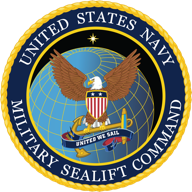CIVMAR base pay is pay you earn commensurate with the size, level of automation, and type of ship. Premium pay is additional compensation over and above base pay to include overtime, penalty pay, hazardous pay and bonus provision(s). CIVMARs are paid on a biweekly pay period, 112-hour basis, with pay every other Friday. There are normally 26 pay periods per year.
Finance
My Pay/DFAS
HRA 2014-3 MSC CIVMAR Payroll Conversion to DFAS
Hours of Work & Premium Pay
Overdue Relief
If you are not able to be relieved as scheduled, you may be entitled to an Overdue Relief Award. The Overdue Relief Award is payable at the rate of $25.00 per day (for days 1-45). It accrues beginning when you arrive at first port after overdue date (the date you requested to be relieved), and it ends when you have been relieved and you depart the ship. The rate increases to $50.00 per day for day 46 and thereafter.
Hazardous Pay
Hazardous pay may be payable under certain dangerous conditions when 50 short tons or more of explosives or dangerous cargo are aboard ship, or when you are required to handle explosives or dangerous cargo. You may be entitled to hazardous pay at the rate of 10% of basic pay. Any questions about premium pay must be addressed with your MPS, Purser, or Master.
In order for you to be paid, time and attendance (T&A) data must be submitted to payroll. If you are in the pool, training, or on leave, your respective MPS will submit your T&A. If you are onboard a ship, the ship’s Purser or Master will submit your T&A. Follow your chain of command for questions regarding pay.
Federal taxes are deducted as calculated on the Withholdings Allowance Certificate Form (W-4). If you claim ”exempt” or more than ten exemptions, a new W-4 must be submitted at the beginning of each year. The payroll system cannot accommodate state tax deductions. It is highly recommended that CIVMARs contact their respective state revenue office or set up a voluntary allotment for state filing purposes.
After payroll is processed, a Leave and Earnings Statement (LES) file is transmitted to the ship’s Purser or Master to print and distribute to each mariner onboard the ship. If a mariner is on leave or in the pool, the LES will be mailed to his/her current mailing address on record. If you do not receive a LES, please immediately contact the CSC at 757-341-4610 or 757-341-4611.
Direct Deposit
All CIVMARs are required to participate in direct deposit/electronic funds transfer as the method of all payment from MSC. Pay is electronically deposited to an account with a financial institute as designated by the CIVMAR.
Allotments, or direct payments from a paycheck, may be established by going to MY PAY, if not assigned to a ship. If aboard ship, see your Purser or the Master for ships without a Purser. Up to three voluntary and five mandatory allotments are allowed. Allotments may be made to your dependents’ financial institution, child support agencies, commercial loan institutions, collection agencies, and government agencies for travel indebtedness or military deposits. In rare exceptions where an electronic allotment cannot be utilized, paper checks will be issued.
See your Purser or Master (on ships without a Purser) for making changes to your allotments or direct deposit information. If not assigned to a ship, you can change your Direct Deposit or set up allotments using MY PAY.
MSC allows CIVMARs onboard ships to make a draw (receive cash) against their earnings to date (including premium pay) within the current pay period. The maximum amount a CIVMAR may draw is 50% of gross pay earned as of that date. To request a draw, contact the Purser or the Master on ships without a Purser.
Pay and Leave Discrepancies / Disputes
If you are aboard ship and notice leave and pay discrepancies, contact your supervisor. If you are not assigned to a ship, contact your MPS or the CSC.
The premium pay dispute form is the document used for CIVMAR question(s) concerning the applicability of Civilian Marine Personnel Instructions (CMPI) with regard to pay. Accordingly, all premium pay dispute forms shall be submitted to the Purser (or Master in the absence thereof) within 30 days of the time in dispute. The Purser shall ensure that the respective Department Head and Master complete each section as appropriate and will forward this form to Labor Relations (LER) at MSC_HR_LER@us.navy.mil within 15 days for final resolution. Where a dispute exists concerning whether premium pay work was assigned or performed, the questions will be resolved under the provisions of the applicable negotiated grievance procedure.
Pay Raise FAQs
(from the Special Assistant for Mariner Affairs)
As you will read below, most of this process is beyond the control of MSC. No one at MSC delays pay raises. The turnaround from when the information is received from the unions until it is forwarded outside MSC is rapid. The nature of the federal government system can just be slow at times. Any time the expenditure of tax dollars is involved — which is exactly what our pay is — all the details have to be perfect to satisfy the public trust.
“Why has my annual pay raise has been delayed?”
I would like to clear up a misconception that seems to be prevalent regarding pay raises. Unlike shore-based civil service personnel, we civilian mariners have no shore-side grade structure; we don’t have to take a civil service exam; and we don’t have to compete government-wide to work aboard ship. In other words, we are not regular, shore-side GS employees. The reason we are treated differently is that we would never be able to crew our ships, if we had to compete competitively for each afloat job every time one opened.
“Where do pay raise standards come from?”
Title Five U.S. Code Section 5348 states, in part, “The pay of officers and crews of vessels excepted from Chapter 51 of this title by Section 5102 c (8) of this title shall be fixed and adjusted from time to time as nearly as is consistent with the public interest in accordance with prevailing rates and practices of the maritime industry…”
This means the various maritime unions recognized as our representatives are used to determine our pay. The unions negotiate with their commercial customers for pay raises. Depending on the success (or lack thereof) of their negotiations, the results are then turned over to MSC. Headquarters reviews the numbers and applies the various laws and regulations that can affect the pay raise — like pay caps, maximum allowable percent increase, etc. Then MSC calculates the rates for each position, places it all in the proper format and sends its recommendation to the Department of Defense for review and approval.
DOD handles base wages directly. For premium rates, the Office of Personnel Management also reviews and approves the rates. DOD and OPM review all the numbers to ensure all the applicable laws and regulations have been properly applied, and they prepare the budget increase necessary to give MSC the funding to enact the raise. If it all checks out, they send approval to MSC.
“What happens once pay raises are approved?”
Once the approval is received at headquarters, the Military Sealift Command is notified to implement the raise. Generally speaking, about four-to-six weeks after the numbers are sent to DOD, DOD gets back in touch with MSC. If the date the unions and their commercial customers have agreed to enact the private sector pay raise has passed, retroactive pay covers the period between that date and when MSC is authorized to implement the new rates.
Garnishments
Federal law authorizes the pay of civilian employees of the federal government to be garnished (or attached) for the payment of child and/or spousal support or the repayment of legal debt, in accordance to 5 C.F.R. Part 581 and 582. In order to implement a garnishment or wage attachment against any civilian employee, an income withholding order, or similar process must be served.
MSC receives numerous requests for information with respect to garnishment of civilian employees’ wages. The following is provided for guidance and information with respect to the Command’s requirement to implement all valid orders for mandatory wage withholding for support and commercial debt.
Should you have any questions concerning garnishments, contact the MSC Office of Counsel at 757-443-1227. Questions about your pay should be directed to the CSC at 757-341-4610 or 757-341-4611.
Travel
According to the Joint Travel Regulations (JTR), MSC will fund travel cost associated with transporting you to/from your assignments, training facilities, CSU and MSC. MSC provides hotel accommodations and transportation to MSC’s Training Center in Freehold, New Jersey, or San Diego, California, at no charge to you. Once you receive your assignment from your MPS, you may be required to travel on TDY travel orders. You may also be issued travel orders to attend training courses, in which you may be authorized a rental car and/or lodging.
All travel orders are requested and approved by your MPS. The CIVMAR Support Division, Disbursing Branch (N872) is responsible for preparing orders and making all transportation arrangements, including rental car and hotel accommodations. Rental cars are only authorized when using Scheduled Air Transportation Office(SATO) endorsed rental companies. Always read the travel orders thoroughly before you begin travel to determine what has been authorized for payment and/or reimbursement, including travel advances, which must be approved in advance. Before you depart the Continental United States (CONUS), make sure you know the port call of the ship and have your travel orders and Government ID available for immigration and customs.
Travel overseas includes several training and administrative requirements before travel orders can be initiated. The CSU staff will assist you in completing the Isolated Personnel report (ISO Prep) questionnaire and the Survival, Evade, Resist, Extract (SERE) code of conduct training.
If you have any questions prior to traveling, or you need to obtain information regarding the contracted bus or hotel, contact the CSC at 757-341-4610 or 757-341-4611. If you need to make travel changes, modifications must be coordinated with your respective MPS in advance. For emergency calls during non-working hours, contact SATO at 800-359-9999.
Travel Claims
Within five days of completing travel, you must submit a travel claim form, DD1351-2 Travel Voucher. Please ensure that you include travel orders with endorsements and receipts for all claimed expenses including the airline eTicket receipt. Additional travel claim instructions are available here. Travel claim forms can be downloaded using the link above or obtained from MSC, the CSU’s or the ship’s Purser. Submit the claim through the appropriate person in the CSU, Purser aboard ship (or Master for ships that don’t have a Purser) or send them to:
Mail:
Military Sealift Command
471 East C Street SP-64
ATTN: TRAVEL CLAIMS
Norfolk, VA 23511-2419
**Email: **MSC_N8_TRAVEL_PRIVATE@US.NAVY.MIL
**Fax: **757-443-2164


